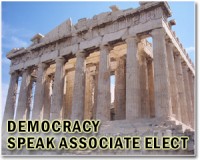| . |  |
. |
Washington (AFP) Feb 11, 2011 US President Barack Obama led increasingly hoarse Western calls for "concrete" change in Egypt as President Hosni Mubarak on Friday clung to power after wrong-footing the world by deciding not to quit. Obama issued a strongly-worded statement late Thursday after a day of drama in Cairo in which hopes that Mubarak would step down were replaced by fury as he only went as far as ceding some authority to Vice President Omar Suleiman. "The Egyptian people have been told that there was a transition of authority, but it is not yet clear that this transition is immediate, meaningful or sufficient," Obama said. "Too many Egyptians remain unconvinced that the government is serious about a genuine transition to democracy, and it is the responsibility of the government to speak clearly to the Egyptian people and the world. "The Egyptian government must put forward a credible, concrete and unequivocal path toward genuine democracy, and they have not yet seized that opportunity." The European Union and Australia also pleaded for change and Germany said Mubarak had not allayed the fears of the world, but, above all, there was widespread shock that the 82-year-old Arab strongman had not resigned. "Egypt will explode," leading Egyptian dissident Mohamed ElBaradei wrote on the Twitter website. "Army must save the country now." Earlier, several hours before Mubarak addressed an expectant nation, CIA Director Leon Panetta had given credence to media reports that the veteran Egyptian leader was about to announce his immediate departure. And when Obama followed up by telling Americans, "we are witnessing history unfold," most observers felt sure the US government expected Mubarak to go. Obama, whose administration has been criticized by some for a flat-footed response to the Egypt crisis, took several hours to issue a written response after an emergency meeting of his national security team. When it eventually came, it was his strongest rebuke yet for the Egyptian government but there was no mention of Mubarak by name and no threat to withhold the longtime US ally's crucial military aid. Obama told Egypt to "move swiftly to explain the changes that have been made, and to spell out in clear and unambiguous language the step by step process that will lead to democracy and the representative government." There were also strong calls for change from the EU's chief diplomat Catherine Ashton. "The time for change is now," Ashton said. "The demands and expectations of the Egyptian people must be met. It is for them to judge whether the steps announced by President Mubarak fullfil their expectations and aspirations." Chinese foreign ministry spokesman Ma Zhaoxu reiterated Beijing's calls for stability. "China understands and supports the Egyptian efforts to maintain social stability and restore normal order," he said. However, Ma deflected repeated questions on which side Beijing supported in the impasse, saying: "Egypt's affairs should be decided independently by Egypt and should brook no foreign interference." German Foreign Minister Guido Westerwelle expressed disappointment, saying Mubarak's speech was not the step forward that had been hoped for. "The worries of the international community are rather bigger after this speech than before," he said. British Foreign Secretary William Hague called for for an "urgent but orderly transition" but drew back from drawing firm conclusions. "We're studying very closely what the president and the vice president of Egypt have said," he told the BBC. Egypt's ambassador to the United States, however, insisted that Suleiman was now de facto head of state. "The president indicated very clearly he was transferring all his presidential authority to the vice president," ambassador Sameh Shoukry told CNN. UN Secretary-General Ban Ki-moon stressed that Egyptians must decide their own political future as he reiterated his call for a peaceful transition to free and fair elections. A statement from his office said the United Nations stood "ready to assist in the process" and urged the Egyptian leadership to ensure protesters could voice their grievances without fear of violence. burs-ag/ao/co
Share This Article With Planet Earth
Related Links Democracy in the 21st century at TerraDaily.com
 Field Marshal Tantawi, Egypt's new strongman?
Field Marshal Tantawi, Egypt's new strongman?Cairo (AFP) Feb 11, 2011 The sudden collapse of Hosni Mubarak's 30-year rule in Egypt had all the trappings of a revolution, but the military strongman at the heart of the new regime is anything but a fresh face. Field Marshal Mohammed Hussein Tantawi, Chairman of the Supreme Council of the Armed Forces, is a 75-year-old veteran of Egypt's wars and political manoeuvres and a long-time close associate of the hated au ... read more |
|
| The content herein, unless otherwise known to be public domain, are Copyright 1995-2010 - SpaceDaily. AFP and UPI Wire Stories are copyright Agence France-Presse and United Press International. ESA Portal Reports are copyright European Space Agency. All NASA sourced material is public domain. Additional copyrights may apply in whole or part to other bona fide parties. Advertising does not imply endorsement,agreement or approval of any opinions, statements or information provided by SpaceDaily on any Web page published or hosted by SpaceDaily. Privacy Statement |